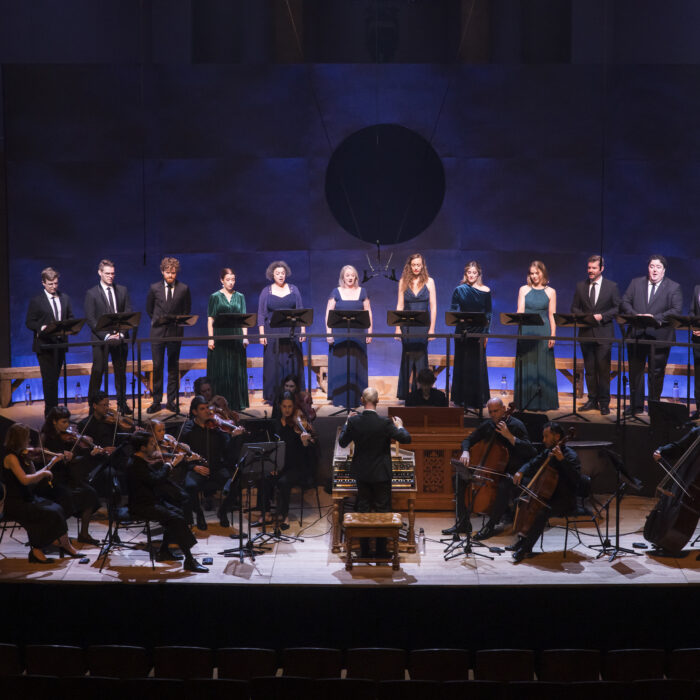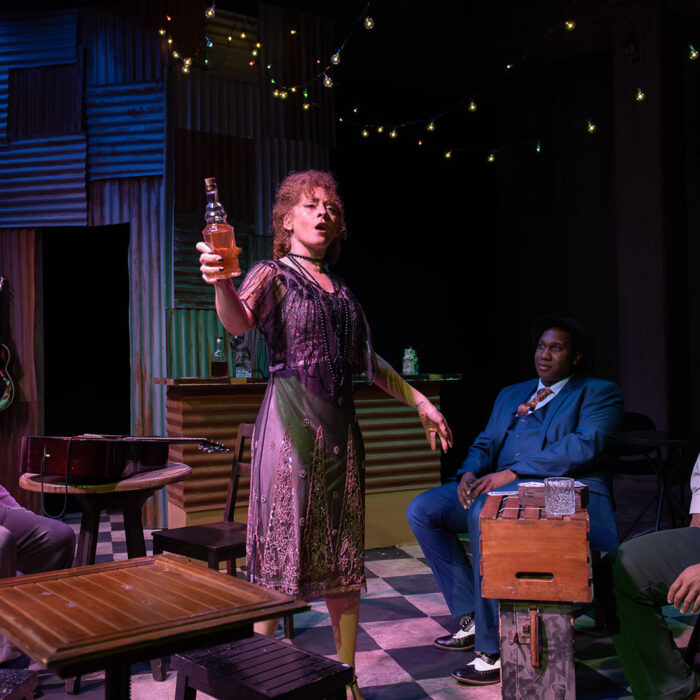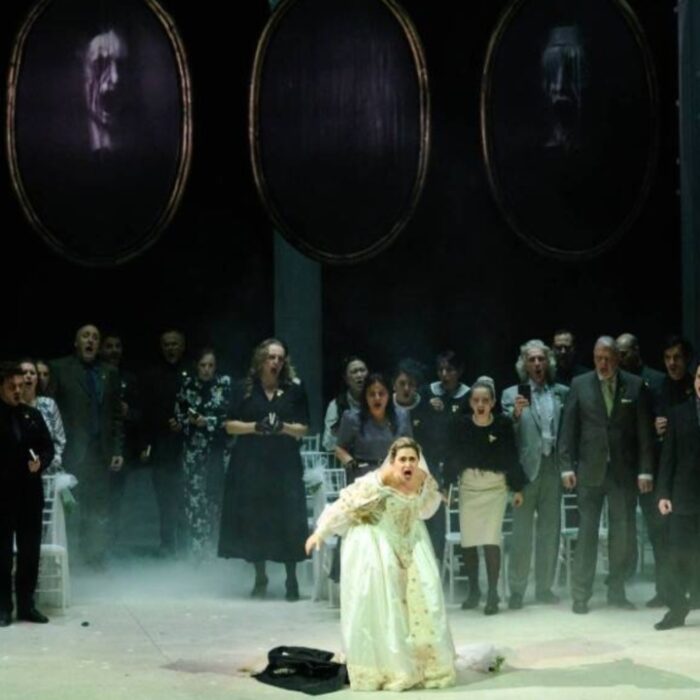
Rossini Opera Festival 2025 Review: L’Italiana In Algeri
Rosetta Cucchi Gives Rossini’s Comedy An LGBT+ Twist
By Alan Neilson(Photo: Amati Bacciardi)
This summer’s Rossini Opera Festival’s imaginative and fast-moving production of the composer’s 1813 comic opera, “L’Italiana in Algeri,” hit the mark in so many ways: it was funny, colorful and energetic; the cast were fully engaged with their characters, which they hammed up brilliantly for laughs; the underlying dynamics of the narrative were expertly handled by the director, who reset the drama in the present day; and musically, the singers and the orchestra combined perfectly to create a wonderful sound. Yet, at the end of the performance, among the loud applause, there could be seen a number of sour faces in the audience.
Cucchi’s Interpretation Successfully Treads a Fine Line
The director for the production, Rosetta Cucchi, decided to play out the drama against the background of the LGBT+ movement with its rainbow colors, flamboyant costumes, drag queens and high camp culture. In fact, Isabella is played as a drag queen, immediately creating further comic possibilities for mocking and humiliating the ultra-macho Mustafà. Her decision, however, was not meant to be provocative; rather, she views it as a return to “Rossini’s spirit of innovation,” as found in his use of “cross-dressing, reversal of roles and freedom from imposed codes” in his buffa operas. Cucchi goes on to explain in her program notes that “the language of drag and that of opera buffa coincide perfectly: both make use of disguise, poses and deceit; both mingle sincerity and parody; both overthrow order to reveal a deeper truth.” It was nevertheless a brave decision, for there are a few people who will react negatively to open displays of transvestitism, especially when used in a beloved work such as “L’Italiana in Algeri” to undermine traditional stereotypes. Even for people who are open to such interpretations, care is needed; opera buffa only works because the political and social messages are never allowed to reveal themselves in an overt, serious fashion; they have to be carried by the comedy. To do otherwise risks alienation. The message will become blatant; it will disrupt the flow of the narrative and may compromise the mood or even appear as a piece of crude propaganda. Redefining Isabella as a drag queen, however, worked perfectly. As Cucchi observes, “a drag queen’s femininity is not natural, but constructed, theatrical and exactly for this reason subversive.”
Cucchi’s directorial decisions were largely well-judged in this respect, as she kept the fun and hijinks almost continually to the fore. Only occasionally did she overstep the line, and even then, the negative effect was minuscule, for example, coloring the sky with a rainbow flag. There was a single instance, however, that really jarred. During the second half of the performance, a genuine black and white newsreel was projected onto the stage of a gay rights march. There was no comedy in this. Aesthetically, it was in contrast to everything else. It was overtly political and had nothing to do with “L’Italiana in Algeri.” Few in the audience would have disagreed with its sentiments, but that was not the point. We were no longer relying on the subversive qualities of a drag queen to undermine Mustafà, and it temporarily changed the mood away from the comedy.
This one instance aside, however, it was a fine presentation. Cucchi, aided by the designers Tiziano Santi (sets), Claudia Pernigotti (costumes), Nicolá Boni (video) and Danile Naldi (lighting), created a staging that was thoroughly entertaining and successfully undermined the character of Mustafà and his values, who in the present-day setting appeared as a particularly absurd figure.
The single set comprised the inside of a plush modern beach villa with large windows and a glass door opening onto the ocean. The lower level was used as a large entertaining room, while the upper level consisted of three rooms, where Mustafà went about his private business. Everything was brightly colored, which was further enhanced by the arrival of a bus full of transvestites and cool dudes ready for a good time on the beach at his expense. The clear blue ocean sky was prone to sudden changes, and not just due to the appearance of colorful rainbows; crazy images of Mustafà and other characters, dancing and singing, reminiscent of pop videos from the 1970s, also occasionally appeared.
Every opportunity was taken to exploit the comedic potential, including the use of video images. The performance had hardly got under way before a stork arrived, but seeing the lack of interest Mustafà was showing in his harem and Elvira in particular, it flew off; it knew it was wasting its time here. The theme was referenced again and again as three of his wives, desperate for his attention, appeared in provocative dress, adopting poses to attract his interest, only to be shooed away or completely ignored on every occasion.
The production relied on our familiarity with stereotypical images associated with the characters. The scene in which Mustafà is awarded the title into of Pappataci could not have been more absurd: he was encouraged to adopt exaggerated effeminate poses, which, given his stiff macho character, was highly amusing and no doubt a humiliation to the pompous bey. Of course, for those in the audience not able or willing to accept the spirit in which the stereotypes were employed, it ran the risk of causing offense, which, of course, was never the intention.
A Cast Fully Engaged With the Comedy
Ultimately, as with any stage performance, nothing will work unless the actors are up to the task. Fortunately, for this production of “L’Italiana in Algeri,” the Rossini Opera Festival had brought together a superb cast that knew exactly how to handle the comedic dynamics of Cucchi’s vision.
Bass-baritone Giorgi Manoshvili, playing the pivotal role of Mustafà, is a bear of a man able to dominate a stage simply by his physical presence, which, with his slow, deliberate movements, allied to his character’s despotic position, egocentric nature and total lack of empathy, made him the perfect dupe for Isabella’s scheming. He came across as a slow-witted, aloof and intimidating character, completely at ease with having every order obeyed no matter how absurd. His use of exaggerated facial expressions added to the impression, in which every action that impacted upon him was met with an over-the-top grimace, rolling eyes, shock or an expression of grand indifference or quite often perplexity. He possesses a voice with a distinctive, burnished and beautiful timbre that makes his singing a real delight, but on this occasion, it was the impressive resonance, confidence and security with which he was able to imbue the vocal line that captured his character’s nature, particularly his arrogance, pomposity and sense of superiority. As his captives and guests piled into a van and departed during the finale, he was left looking suitably ridiculous.
Having Daniela Barcellona cast in the female role of Isabella whom she played as a man pretending to be a woman, was a wonderful theatrical conceit that offered up plenty of possibilities for further amusement. It also was an opportunity for Barcellona to show off her fine acting abilities as she rolled easily with her dual identity, and which made her relationship with Lindoro quite complex, depending upon how one wished to view the metatheatrical aspects of the production. Like Manoshvili, she possesses a strong presence and thus was able to present Isabella as a convincing adversary. Her vocal performance was spirited, confident and expressively persuasive, in which she furnished the vocal line with detail, emotional nuance and pleasing coloratura displays, which was sensitively illustrated in her cavatina “Per lui che adoro.”
Soprano Vittoriana De Amicis played up the role of Elvira brilliantly. Initially, dressed in the drabbest clothing imaginable, she tried in vain to seduce her husband, who showed her nothing but contempt. Following the interval, however, she transformed into a highly sexualized version of herself, dressed in a black leather catsuit and mask. She appeared to be two totally different characters, united only by her excellent comic timing, which was expertly crafted to exploit every scene in which she appeared. It was also an enjoyable and exciting vocal performance, in which her bright, crystalline and piercing voice could not fail but to hold the attention, which she employed with a high degree of versatility and sensitivity to the drama.
Tenor Josh Lovell, cast as the lively and endearing Lindoro, engaged playfully with the comedic shenanigans, as he joined with Isabella to outsmart and humiliate Mustafà and, to a lesser extent, the lustful Taddeo. His voice lay easily on the ear, as it glided smoothly along the vocal line and transitioned seamlessly between registers. Along with numerous ensemble numbers, he has a couple of arias to sing, which he presented in a fresh, neatly articulated and easy-going manner.
Baritone Misha Kiria played the role of the aging, lecherous Taddeo in typical buffo fashion. Everything was keenly exaggerated, and like Mustafà, he was easily manipulated. In line with the colorful production, he was dressed in a bright pink suit. He produced an animated, energetic vocal performance that captured his character’s buffoonery, with a larger-than-life interpretation that kept the audience thoroughly amused.
Baritone Gurgen Baveyan, cast as Haly, proved to be a weak and fawning Captain of the Algerian Corsairs, who was suitably threatened and bullied by Mustafà. He used his aria, “La feminine d’Italia,” to show off his interpretive skills to good effect.
Mezzo-soprano Andrea Niño busied herself as Isabella’s spirited slave and confidante, Zulma.
The conductor Dmitry Korchak oversaw a vibrant, rhythmically energetic reading from the Orchestra del Teatro Comunale di Bologna that exhibited an exciting forward momentum which was closely allied to the staging. He maintained a sensitive balance between the orchestral sections and the singers, in which his handling of the ensemble numbers was sensitively managed to bring out the beauty of the harmonic combinations of the voices; the rendition of the duet “Se inclinassi a prender moglie,” which combined Manoshvili and Lovell’s widely contrasting voices, came together to produce a particularly satisfying rendition.
Provided one approached the performance with an open mind, this was a hugely enjoyable production, both musically and as a piece of comic drama. Although the insertion of overt propaganda into a work of art can be difficult to accept, Cucchi’s vision for “L’Italiana in Algeri,” with its focus on the LGBT+ movement, worked well, mainly because she embedded it into the fabric of the narrative and, apart from a single exception, never promoted it at the expense of the drama.



